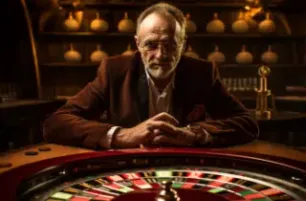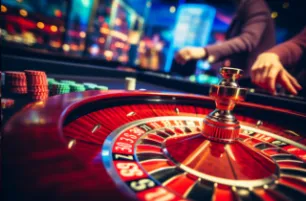The History of Roulette
Uncover the fascinating origins and evolution of roulette in our in-depth article. From its beginnings in 17th century France to its modern-day prominence in casinos worldwide, delve into the rich history of this iconic game and gain a deeper understanding of its enduring appeal and timeless charm.
The history of roulette dates back several centuries and is believed to have originated in France during the 17th century. The game's name itself translates to "little wheel" in French, which perfectly describes its iconic spinning wheel. While the exact origins of roulette are somewhat unclear, it is widely believed to be a fusion of various English and Italian gambling games that were popular during that time.
The early versions of roulette featured a wheel with alternating red and black pockets, with numbers randomly placed throughout the wheel. However, it wasn't until the mid-19th century that the modern roulette wheel, with its distinctive layout of alternating red and black numbers and a green zero pocket, was introduced. This change was implemented by the Blanc brothers, François and Louis, who operated the renowned Monte Carlo Casino in Monaco. The addition of the green zero pocket gave the house a slight advantage, marking the birth of the "European" version of roulette.
During the 19th century, roulette gained immense popularity throughout Europe and eventually made its way to the shores of the United States. However, the Americans introduced a slight variation to the game by adding an additional green pocket with a double zero. This alteration gave rise to the "American" version of roulette, which became a staple in casinos across the United States.
Over the years, roulette continued to evolve and adapt to changing times and technological advancements. With the advent of online gambling, roulette became readily accessible to players worldwide, further expanding its popularity. Online roulette introduced various versions of the game, including live dealer roulette, which allows players to experience the thrill of playing with a real dealer via live video streaming.
Today, roulette remains one of the most iconic and beloved casino games, captivating players with its elegant simplicity and potential for big wins. Its rich history and allure have made it a timeless classic that continues to captivate gamblers in both land-based and online casinos around the world.
The Monte Carlo Fallacy
The Monte Carlo Fallacy, also known as the Gambler's Fallacy, is a psychological misconception related to probability and chance. It gained prominence after a notable event that took place in the Monte Carlo Casino in 1913.
During this event, the roulette wheel at the casino produced an astonishing result: the ball landed on the black pocket for a remarkable 26 consecutive spins. This occurrence caught the attention of gamblers and statisticians alike, as it seemed to defy the expected odds and sparked a significant controversy.
The Gambler's Fallacy arises from the mistaken belief that previous outcomes in a random event, such as roulette, can influence future outcomes. In the case of the Monte Carlo Fallacy, some individuals began to assume that since black had appeared so many times in a row, the next spin was more likely to result in a red outcome. They believed that the streak of black spins had created an imbalance in the probabilities, leading to a higher chance of a red outcome to "balance" the sequence.
However, this belief is entirely incorrect. Each spin of the roulette wheel is an independent event, and the outcome of one spin has no bearing on the next. The probabilities of landing on red or black remain the same with each spin, regardless of the previous outcomes. In fact, the chances of the ball landing on black or red on any given spin are always close to 50/50 (excluding the presence of the zero or double-zero pockets).
The Monte Carlo Fallacy serves as a cautionary tale and a reminder that probability and chance are not influenced by past outcomes. It highlights the human tendency to seek patterns or trends where none exist and demonstrates the importance of understanding the principles of randomness in gambling and other areas of life.
The Blanc brothers
François and Louis Blanc were prominent figures in the history of roulette, known for their significant contributions to the game. The Blanc brothers were French entrepreneurs and casino operators during the 19th century.
The Blanc brothers' reputation grew, and they became instrumental in establishing luxurious casinos in various European cities. One of their notable ventures was the renowned Monte Carlo Casino, located in Monaco. They played a crucial role in transforming Monte Carlo into a prominent gambling destination, attracting high-profile gamblers from around the world.
Roulette's most famous places
Roulette, being one of the most popular casino games, has gained fame and recognition in various destinations around the world. Some of the most famous places associated with roulette include:
- Monte Carlo, Monaco: Monte Carlo is synonymous with luxury and elegance, and its famous Monte Carlo Casino is renowned for its glamorous atmosphere and high-stakes roulette tables. It has been featured in numerous movies and is a symbol of opulence and prestige.
- Las Vegas, Nevada: Known as the gambling capital of the world, Las Vegas boasts a multitude of casinos offering a wide range of roulette games. The iconic Las Vegas Strip is home to many renowned casinos where players can enjoy the excitement of roulette amidst the vibrant lights and entertainment.
- Atlantic City, New Jersey: Located on the East Coast of the United States, Atlantic City is another popular destination for roulette enthusiasts. The city offers a variety of casinos that feature roulette tables, providing a thrilling gambling experience alongside its beautiful boardwalk and beach.
- Macau, China: Often referred to as the "Las Vegas of the East," Macau is a major hub for gambling and boasts some of the world's largest and most luxurious casinos. Roulette is a popular game in Macau's casinos, attracting both local and international players.
- London, England: The United Kingdom's capital is home to several prestigious casinos that offer high-quality roulette experiences. From traditional casinos to modern gambling establishments, London provides a diverse range of roulette games for players to enjoy.
- Baden-Baden, Germany: Known for its elegant spas and historic architecture, Baden-Baden is a charming town that has been associated with roulette for centuries. The local casino, Casino Baden-Baden, is one of the oldest and most renowned casinos in Europe, offering an exquisite roulette gaming experience.
These destinations have become synonymous with the excitement and allure of roulette, attracting players from around the world who seek memorable gambling experiences in iconic settings.



